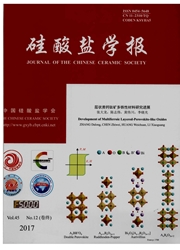

 中文摘要:
中文摘要:
基于“均强度准则”理论,研究了应力梯度、表面和体积缺陷对玻璃弯曲强度的影响,建立了玻璃弯曲强度的厚度效应方程,计算了应力梯度对不同厚度玻璃的弯曲强度影响。结果表明:玻璃弯曲强度的厚度效应呈非线性关系,应力梯度只对厚度小于2 mm以下的玻璃弯曲强度产生明显影响,且厚度越薄,弯曲强度的厚度(应力梯度)效应越大。提出了一种通过小挠度低应力梯度弯曲模型下超薄玻璃弯曲强度测试方法—“等效涂层法”,推导了超薄玻璃弯曲强度计算公式。通过对不同厚度的玻璃的弯曲强度测试,并与GB/T 6569—2006规定的测试方法得到的结果进行对比,验证了“等效涂层法”测试结果的准确性和可靠性。
 英文摘要:
英文摘要:
The influences of stress gradient, surface and volume defects on the bending strength of the glass were investigated based on the theory of "mean-strength criterion". The thickness effect equation was proposed to calculate the stress gradients related to the bending strength at various thicknesses. The results show that there is a nonlinear relationship between the stress gradient and the bending strength of the glass. A great stress gradient appears at the thickness of 〈 2 mm, and the thinner the thickness of the glass, the greater the stress gradient will be. A test technology for the bending strength of the ultrathin glass was developed by using an equivalent coating method. The calculation equation of the bending strength of the ultrathin glass was derived. A serious of glass samples with different thicknesses were examined. The calculated results agree well with the experimental results of common glass measured according to GB/T 6569-2006, indicating that the "equivalent coating method" is feasible for ultrathin glasses. The strength of ultrathin glass was obtained by simple bending tests with a small deflection and a low stress gradient.
 同期刊论文项目
同期刊论文项目
 同项目期刊论文
同项目期刊论文
 期刊信息
期刊信息
